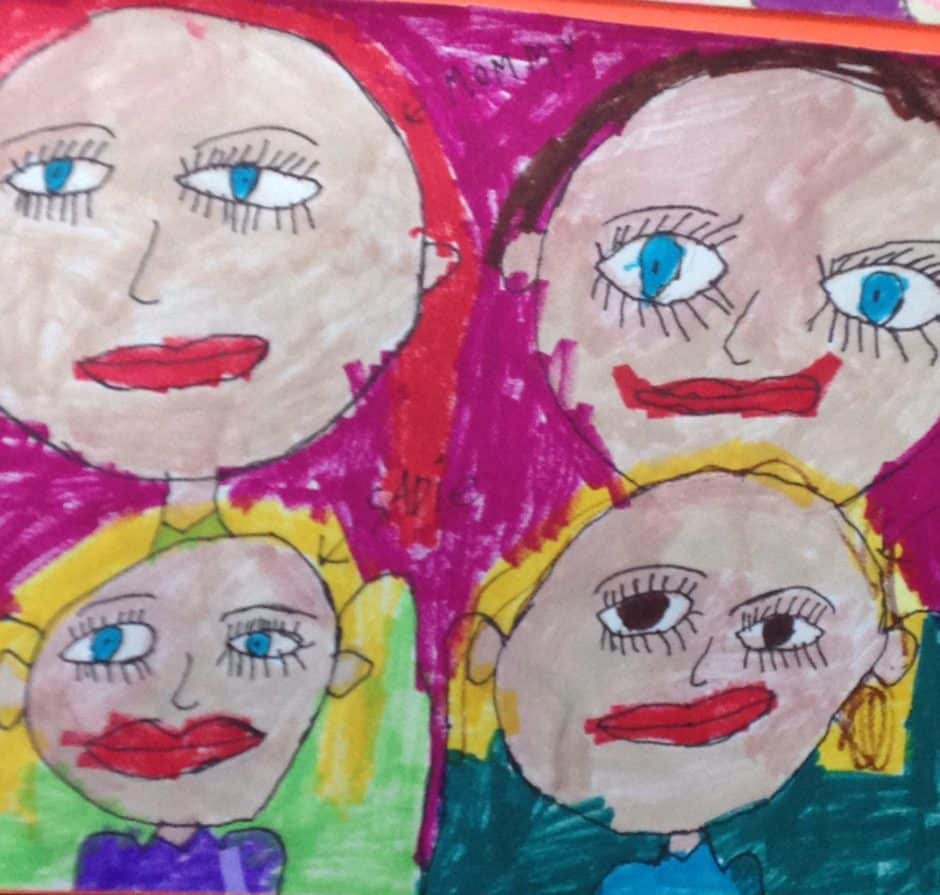by Marlene Olin
Margaret hears the sound of cabinet doors slamming. When she walks into the kitchen, her heart lurches. The walls are splattered, the floors crunchy. But her daughter’s happy. Tomato sauce spackles Risa’s hair and her glasses. On top of a pot, steam billows.
“Dinner’s almost done,” says Risa. A tornado of arms and legs, she whirls from the sink to the stove. “By my calculations, nine minutes tops.”
Once again Margaret glances at her kitchen. Risa has created a workspace like she’s been taught. The counter is covered with newspaper. The ingredients lined just so. Bay leaves. Garlic. Onion. Oregano. The measuring spoons and cups. The mixing bowls and slotted spoons. Not one dish will be cleaned until after dessert. Order is everything.
“Looks great, sweetie. It’s such a help when you cook dinner.” Then Margaret mentally makes a note of the post-cleaning required long after her daughter has cleaned and gone to bed.
But there’s no denying that Risa’s happy. There’s a lift in her step and she hums while she works. When she’s finished, she walks up to Margaret. Most people would leave an ample amount of space between them. But space is subjective. Space is a loose and wobbly entity that one intuits. Instead Risa lines up toe to toe with her mother and waves a finger in Margaret’s face.
“One more step on the road to independence, Mom.” Then she remembers her smile cards and creases the corners of her mouth.
***
Three hours later, they are lying down. Risa’s bedroom has looked the same for decades. The sheets are soft and flannel, the shelves lined with her collections. Stones. Crystals. Shells.
As always, Margaret picks a book of poems and reads. Dickinson tonight. Perhaps Browning tomorrow. Outside the window the moon waxes and wanes. Inside the words fall like waves. It’s the sound that matters, the lilt, the lull, the up and down. Meanwhile Margaret stifles yawn after yawn. Her day can’t end soon enough.
“Do you know that a giraffe just needs 1.9 hours of sleep?” says Risa.
While she turns the page, Margaret listens to the quiet of her house. A TV drones. A dryer rumbles. Somewhere her husband is lurching. Hunched, his hands clenched, his eyes darting. A lost soul, her husband. A Victorian ghost. A daguerreotype, grayed and grim, save for the waistcoat and watch.
“Do you know that sharks have to keep moving?” says Risa. “Do you know that sharks never sleep?”
“Never sleep?” says Margaret.
Despite herself, Margaret savors the moment. For she knows that moments like these will soon be come and gone. This is the year that Risa’s turning forty. With the proper supervision and support, Risa will be getting her own apartment. Her bags will be packed. The house will be emptied. The shrinks, the social workers, the experts all say it’s time.
On the ceiling are Day-Glo constellations. As soon as the lamp’s turned off, they grab the light. Margaret closes her eyes. In seconds she’s transported to 1980’s. They had just moved to Miami for her husband’s new job.
“Spring has sprung!” said the banner. Bunnies and egg-lined baskets. A chain of pastel construction paper crisscrossed the room.
The teacher kept her voice to a whisper. “I have twenty children in my kindergarten. Twenty children and two aides. But Risa’s the one we watch. She runs with scissors. Walks into the seesaw. The other day she followed a stray dog out the school and down the block.”
What was her name? Miss Susan or Miss Sarah. It was mythical the way she saw into the future. Like some sort of blind seer. Back then there were no catchphrases. No spectrums. No labels. Nothing to hang your hat on but despair.
“Her IQ is sky high. That’s obvious. And her knowledge of trivia endless. But she flinches at the slightest touch. She’s terrified of hugs.”
Instead of friends, Risa had pets. No dogs or cats. Margaret’s husband was allergic. To the hair. To the dander. To the pollen on their fur. Instead they adopted an ever-changing zoo. A guinea pig that kept them up all night. A savage hamster. A gerbil that found its way into the dryer duct. Saltwater fish. Freshwater fish. One morning they’d be fine. Then the next they’d be floating, a lifeless eye staring toward the light.
A fitful sleeper, Risa tosses and turns while Margaret inches closer to the edge. Of course, her daughter has no idea what awaits her. Noisy neighbors. Nosy landlords. Butt crack plumbers. Pervs. But what Margaret fears most is the loneliness. She can see it now. The hours of bone-crushing silence, the kind of quiet that screams.
Margaret’s dealt with pitfalls and potholes. And now an old familiar panic starts to grow. Margaret’s learned to trust her instincts. Her instincts rarely fail her. But all she envisions are red lights and stop signs. Risa’s own apartment? All she can hear is her voice shouting no!
Meanwhile Margaret’s bullied right and left.
From her son, the lawyer in Washington, the one who will one day bear the burden. Each rebuke is spewed with fear: “You’re not getting younger, you know.”
From the shrink. Good or bad, inspired or idiotic, the meter keeps running: “What’s the worst that can happen?”
From the professionals in their air-conditioned offices, sweatered in smiles, gripping their coffee cups, glued to their screens: “It’s time to cut the cord, Mom.” Like Margaret’s a fucking stereotype. Like there’s an instruction manual she somehow missed.
Only her friends can she count on. In darkened rooms, she sobs while they sip Chablis. “She’s going where?” They say. “You’re doing what?”
But her daughter is insistent. She’s like a dog with a bone. Pulling. Tugging. The whole world has narrowed to this one theme, this one topic, this one road.
Margaret lowers her voice, taps into some patience, and slips a mask of calmness on her face. It won’t be as easy as you think, Margaret reminds her. The words coil like an undercurrent, slipping into every conversation. You’re too kind-hearted. Not everyone is as trusting and as kind-hearted as you.
But no argument chips the concrete. Instead Risa rolls her eyes. Then she reminds her mother of her accomplishments. The 3.3 average in college. Her job at the library. Plus she’s cooked dinner for three nights straight!
***
They make apartment hunting more of a pastime than a project. Marilyn, their realtor, is a friend. Blonde, bronzed, roped with jewelry, she carves out time in her busy busy schedule. She has known Margaret and Risa since forever.
Every Sunday, it is now part of their routine.
Marilyn points out the window. Beyond the pool is Biscayne Bay. “The condo is vacated,” says Marilyn. “Its owners just fled. Tax problems. Immigration problems. Who knows? A bedroom and two baths plus lots of light.”
Margaret struggles to find fault but finds herself tongue-tied, stumped.
“I like this place,” says Marilyn. “There’s a nice view. Incredible amenities. A party room plus a gym!”
While Margaret follows the swoop of her hand, Risa has disappeared. They find her checking out a spider down the hall. When she joins them, her face is vacant, her eyes glazed. Security deposits. Down payments. It’s all too much too absorb.
“Do you know that living rooms were once called parlors?” says Risa. “When you died, they laid out your body on a table. Then all your friends and relatives dropped by.”
“Really?” says Marilyn. She is listening and not listening. Punching her phone.
“Really,” says Risa. “Then one day death became a business. Morticians took the bodies, cleaned them up, and moved them to funeral parlors. Then people started calling their parlors living rooms. Get it? Living rooms.”
“Is that a fact?” says Marilyn.
“Do you know that after mating,” says Risa, “the male arachnid dies?”
It was eighth grade. All the kids in Risa’s private school were supposed to perform community service. The voices in Margaret’s head said no. The voices yelled and screamed, are you insane? But Risa pleaded, all the kids were doing it, here’s the list of places we can go.
The plan was to drop her off at the animal shelter every Saturday. Margaret insisted on her version of a hazmat suit. Long sleeves, long pants. Covered shoes. They gave Risa all the jobs no one else would do. Clean bird shit from cages. Clean dog shit from crates. Every afternoon Margaret would pick Risa up, drive her home, and direct her straight into the shower.
Still the first month went smoothly. No chore was too vile. Risa would rake her fingers through a dog’s fur and instantly decompress. She’d stroke a cat and shudder as it purred. It was the second month that proved a disaster.
A staff member named Timmy started hanging around. A scruffy beard to cover up the acne. Torn jeans and checkerboard teeth. He’d wash a dog and spray Risa with the hose until her clothes clung. Then he’d warble, look who’s got titties. He talked her into wearing white tee shirts, the more to gawk at when they clung.
Then one day he asked her along to pick up a litter. They took off in his truck, his hand slipping on and off the gear stick, digging in the space between her thighs. You working out, Risa? She sat up straighter, startled. You seem tense, he said. I can feel your muscles clench.
She took a shower for two hours that night. Then she plucked out all her eyelashes. Clean couldn’t get clean enough.
But Marilyn’s not on the program. While Margaret wants to press the pause button, Marilyn’s programmed to make a deal. It’s almost Thanksgiving when she finds the perfect apartment. Fully refurbished. Fort Knox Security. The place is only two miles from their house.
“I’m sending you a lease,” says Marilyn. “We’ve got to jump on this one fast.”
The three of them had just finished eating a quick dinner in the kitchen. Margaret. Her husband. Risa. The family response is all too easy to predict.
The husband retreats to his den.
Margaret gulps an antacid followed by an Ativan chaser.
Risa puts her hands on her hips. Then she lectures her mother theatrically like she’s seen people do on TV. “Everyone has their own apartment. I’m the only person in the world without her own apartment. This is your problem, Mother. Not mine.”
“But Risa,” says Margaret scrambling for words.
Next her daughter lifts her chin toward the ceiling and starts bugling like an overgrown toad. When she’s finished with her performance, she turns once more to Margaret.
“Do you know,” says Risa, “that a Panamanian gold frog has no outside ears? It can even ignore its own voice.”
The days slog by. Marilyn texts every hour on the hour while the three of them gnash their teeth. But the more Margaret vacillates, the more anxious Risa becomes. She gives up sleep altogether. She bites on her lips and chews on her hands, gnawing her nails to the quick.
If only there were a guidebook, thinks Margaret. A primer for extraordinary people who crave ordinary lives. The problem is so much more than geography. There’s a hole in Risa’s heart that she can’t identify let alone fill. Though Risa’s life is consumed with routine, it’s shockingly empty. Sure she has contacts on social media. But they aren’t true connections. They aren’t real friends.
And while Risa stays stuck, the rest of the world has moved on. Her brother has married and has two children. Even her younger cousins have families, too.
Is this something you can imagine? Margaret once asked her. Is this something that you want? When you look into the future, is this something that you see?
No, says Risa. I really can’t.
It’s a reality that Margaret has difficulty accepting. At night, she dreams of happy endings. She pictures satin wedding gowns. A handsome groom and a multi-tiered cake.
But there’s no cooing infant in this picture. There’s no strolling down an aisle festooned with baby’s breath and ferns. Instead, Risa envisions a menagerie, a home for the lost and the neglected. There are no playpens and Pampers. Instead there’s meowing and barking. Chirping and cheeping. Room after room of flying feathers.
Her husband hides. Her son yells. Her realtor nags. And like mercury in a thermometer, her daughter’s stress shoots up. Meanwhile Margaret walks on tiptoes and speaks in whispers. It’s like living with a volcano that’s bound to explode.
“I hate you, Mother,” says Risa.
“They want signatures,” says Marilyn.
But Margaret shakes them off. There are and will be other apartments. This is another roadblock they can overcome.
She spends hours on the computer. Then she locates a special organization in Wisconsin that sells trained dogs. They aren’t service dogs. Risa would have to wait years for a service dog. But they know forty commands right off the bat.
The family response is all too easy to predict.
Risa’s eyebrows nearly jump off her head. Then she bounces up and down like she’s on a trampoline, waving her hands and wiggling her fingers. “I’m getting a dog! I’m getting a dog!”
The husband starts sneezing.
The son whines. “I always wanted a dog. We never got a dog before. Now Risa gets a dog?”
By January, the two of them are in Madison. The temperature is below zero and everything’s white. The rental car passes frozen lake after lake, the air’s still, the sky crisp. A few crazies are ice-fishing. Convenient stores sell cheese balls, cheese curds, cheese soup. Churches scream, Save Your Soul! Their laps are littered with road maps while their phones prove useless. Heading into the woods, they drive clean off the grid.
After two hours, they locate the kennel. Ten acres, a barn, and a house. A lumberjack kind of guy opens the door. Six feet tall, he’s a Paul Bunyan look-alike. Flannel shirt. Workman boots. Jeans.
Soon their efforts are rewarded when twenty Labrador Retriever puppies greet them. Black. Yellow. Brown. Licking. Yapping. Pawing. Deciding is impossible. Ridiculous! With tears in her eyes, Risa becomes enamored with each and every one.
Finally, as the sun sets, a gold-colored dog picks Risa. She is sitting on the floor when a two-month-old ball of fluff waddles over, lies in her lap, and falls asleep. Smiling, Risa gives her a name. She looks like a Milly, don’t you think? Then they say their goodbyes and leave the puppy in Wisconsin to be trained. After a five-month gestation period, they’ll fly back. Then they’ll pick up the newest member of the family.
In the meantime, they get ready. They sign a lease. Purchase furniture. And every few weeks they’re emailed photos of the dog. Risa forwards them to everyone she knows. Like any proud parent, she diligently records milestones. She carries a brag book. To strangers on the bus she says, Have you seen anything cuter? To her mother she says, You’re the best.
There are commands to learn and supplies to buy. Leashes. Crates. Rawhide toys. Could Risa register for gifts at a pet store, Margaret wonders? Can I send out an announcement when our latest addition arrives? Sure, she tells her friends. Getting a new dog doesn’t have to be this hard. But when is learning to love ever easy?
Marlene Olin was born in Brooklyn, raised in Miami, and educated at the University of Michigan. Her short stories have been featured or are forthcoming in publications such as The Massachusetts Review, PANK, Catapult, and The Baltimore Review. She is the winner of the 2015 Rick DeMarinis Short Fiction Award, the 2018 So To Speak Fiction Prize, and a nominee twice for both the Pushcart and the Best of the Net prizes.
~~~~~~~~~~~~~~~~~~~~~~~~~~~
Blow Your House Down is a powerful testimony about the ways our culture seeks to cage women in traditional narratives of self-sacrifice and erasure. Frangello uses her personal story to examine the place of women in contemporary society: the violence they experience, the rage they suppress, the ways their bodies often reveal what they cannot say aloud, and finally, what it means to transgress “being good” in order to reclaim your own life.
Pick up a copy at Bookshop.org or Amazon.
~~~~~~~~~~~~~~~~~~~~~~~~~~~
Anti-racist resources, because silence is not an option
~~~~~~~~~~~~~~~~~~~~~~~~~~~















